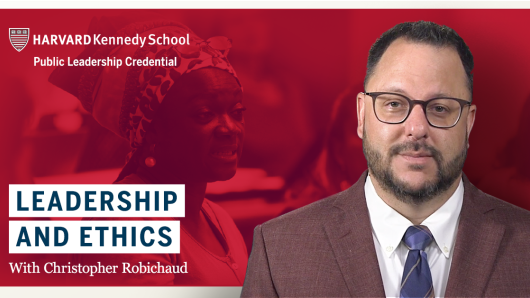Leadership and Ethics: Moral Leadership in Personal Practice

- Intermediate

Distinguish between adaptive challenges and technical problems.
Understand the difference between possessing authority and exercising leadership.
Describe why failure is integral to practicing leadership.
Differentiate between pursuing the greatest good and protecting individual rights.
Manage the complexities involved in negotiating values within a group and explain why moral trade-offs are inevitable in adaptive leadership.
This course is part of the Public Leadership Credential at Harvard Kennedy School. https://www.hks.harvard.edu/educational-programs/public-leadership-cred…
Effective leaders are constantly trying to understand how change can occur to impact the public good. In Leadership and Ethics, created by Christopher Robichaud, senior lecturer in ethics and public policy at Harvard Kennedy School, in concert with a team of the School’s learning designers, individuals can acquire the skills necessary to begin the practice of moral leadership to instill change that has lasting impact on your community.
While many people believe leaders exude heroic behavior and give inspiring speeches, moral leadership is not, in fact, about taking charge and acting alone; moral leadership is about helping people define the problems they face, disagree productively, and make progress toward solutions. In Leadership and Ethics, you will learn that being a moral leader is not about always knowing what is right or how to solve problems. Instead, moral leaders acquire the skills to mobilize people and engage with those problems to find solutions.
This course is part of the Public Leadership Credential from Harvard Kennedy School. Courses are designed for professionals with a bachelors degree and a minimum of five years of experience, and a commitment to the public good. Participation in the program requires proficiency in English and 10 to 12 hours per week dedicated to reading, viewing multimedia materials, participating in group learning activities and discussions with peers, and completing interactive assignments.